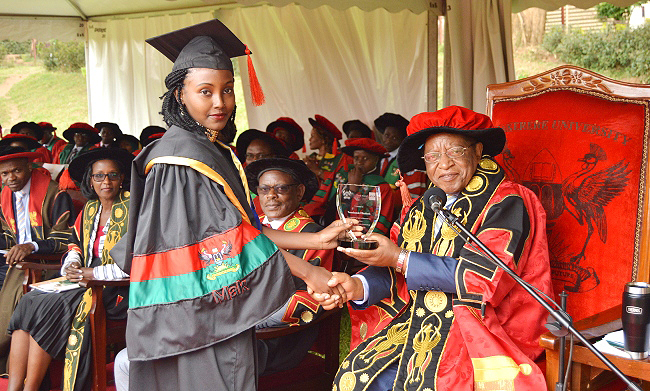The Chancellor of Makerere University Prof. Ezra Suruma has challenged African Governments to evaluate the effect of entrusting their respective economies to foreigners as a way of solving unemployment among their populations. Speaking during the second session of the 69th Graduation Ceremony on Wednesday, 16th January 2019, Prof. Ezra Suruma said that African governments have withdrawn from investing and supporting domestic enterprises hence permitting foreigners to dominate the economy and operate on private basis.
“Selling government enterprises to foreign owners in the name of privatization cannot solve the problem of unemployment. The problem is now bigger than ever before partly of course because of high rates of population growth. I do not believe that there is any serious government in the world that expects foreigners to solve its employment problem. At best they can contribute but they cannot substitute for domestic investment and domestic enterprise,” he said.
According to Prof. Suruma, Africa in the past faced global ideological contradictions concerning the choice between liberal capitalism and a planned economy. He noted that the world has since the 1980s changed and the second and fastest growing economy in the world today is a planned economy. In his humble opinion, the idea that government withdrawal from investing in and supporting domestic enterprises solves the employment problem is a cruel joke.

“Even the capitalists themselves have abandoned this extremist ideology in favor of more complex activist government policies. In the circumstances in which we found ourselves in the 1980s and 1990s we opted to accept conditionality from global lenders that virtually required us to eliminate government enterprises in favor of foreign enterprise,” he explained.
The Chancellor added that the performance of the Chinese economy in the past three decades has demonstrated beyond doubt that private enterprise requires systematic and deliberate support from Government. Prof. Suruma, therefore said that it is the duty of government to ensure that domestic entrepreneurs have access to capital on terms that will enable domestic enterprises to compete with foreign enterprises in the sale of their goods at home as well as in regional and domestic markets.
“As we move to sell our oil resources in the near future, I hope that some of the oil revenues will be channeled into capital to finance domestic enterprises owned by Ugandans so that we are no longer dependent on foreign enterprises to create full employment. If you wish to find out more about these ideas please read my book, Advancing the Ugandan Economy: A Personal Account (published by Brookings Press, Washington DC, 2014),” he remarked.

During the second session of the 69th Graduation Ceremony, graduands from the College of Business and Management Sciences (CoBAMS), College of Veterinary Medicine, Animal Resources and Bio-Security (CoVAB) and the College of Computing and Information Sciences (CoCIS) were conferred upon degrees and awarded diplomas of Makerere University.
The Chancellor congratulated the overjoyed graduands upon their academic achievement. He extended sincere gratitude to the parents, guardians, teachers, mentors and peers for the help and counsel accorded the graduands over the years.
Speaking about ethical uprightness, Prof. Suruma said, “It is simply unacceptable to compromise on the moral integrity of the university. When that happens everyone suffers. We begin to doubt the value of every degree coming from Makerere University. Those who have worked hard to earn their marks become victims of those who have cheated. Anyone who participates in any way in casting a shadow over the academic records of the university is an enemy and must be treated as such.”

He therefore urged students, parents, faculty, alumni, government, the media and public at large to fight all forms of immorality and to say an irrevocable NO to all forms of corruption in the university.
The Vice Chancellor, Prof. Barnabas Nawangwe applauded members of staff that graduated in their respective academic disciplines. “Your dedication to improve yourselves academically as well as our students is commendable. I am certain this will boost the Makerere University academic profile,” he said.
He thanked the President of Uganda H.E Yoweri Kaguta Museveni and the First Lady and Minister of Education and Sports Hon. Janet Kataaha Museveni for the unwavering support to Makerere University to consolidate her position as a modern 21st Century University. In the same spirit, the Vice Chancellor thanked the development partners for supporting Makerere University’s mutually beneficial development programmes.

“Our visibility as an institution continues to improve with your support, and we are constantly exploring ways to incorporate the sustainability component in all our activities. Makerere University has continued to rank among the top five universities in Africa and among the top 400 globally. Makerere is also considered the best black university on earth. We welcome more development partners to support us in further strengthening teaching and learning as well as research and innovation,” he said.
During the second session, the Association of Chartered Certified Accountants (ACCA) Uganda recognized the best performing student in Bachelor of Commerce (Accounting Option) at Makerere University. The Chancellor together with the Association’s representative presented the ACCA Award to Ms. Tumukunde Elizabeth amidst thunderous applause from the congregation.
On the same day, the Mastercard Foundation Scholars Programme at Makerere University recognized its best student of the year 2019; Mr. Katuramu Charles who scored a Cumulative Grade Point Average of 4.58, earning himself a First Class Honours degree.
Article by Mak Public Relations Office
Mak 69th Graduation Kicks Off: President Museveni Honoured


 General10 hours ago
General10 hours ago
 General10 hours ago
General10 hours ago
 Humanities & Social Sciences1 week ago
Humanities & Social Sciences1 week ago
 General1 week ago
General1 week ago
 Agriculture & Environment2 weeks ago
Agriculture & Environment2 weeks ago






